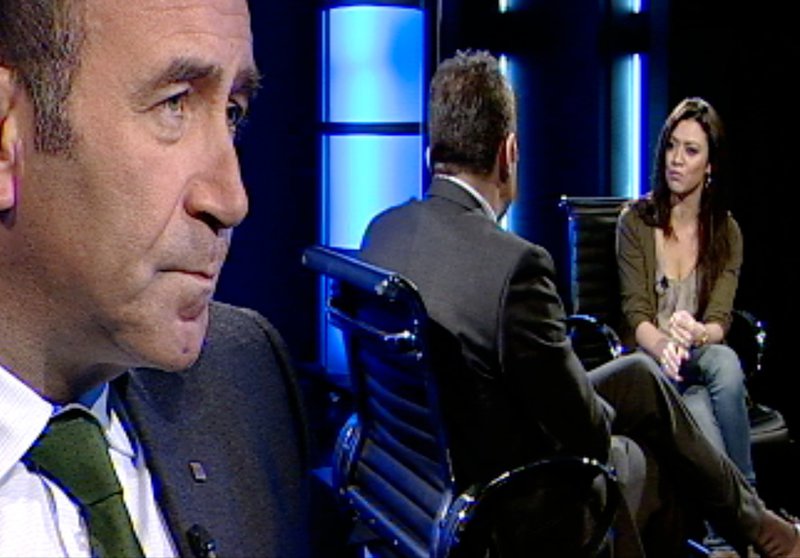Interview
The right person at the right time
Miquel Calçada Every Wednesday at 6.30pm on El Punt Avui TV, Marcela interviews prominent English speaking residents in Catalonia or relevant Catalan figures. Here is her recent interview with Miquel Calçada.
You spent almost two years studying in America. Tell me about English and your US experience.
I started English when I was 14 but I always wanted to study abroad, especially in the US. I couldn't study when I was supposed to, in my 20s. I started my university studies when I was 25-26, after finishing the TV programme, Persones humanes, so I became a journalist with an academic degree only 15 years ago. Often when they're in their 40s, people want to change their career and this happened to me. That's why I didn't want to do a masters in journalism – I chose public administration and international relations. The experience helped me grow.
Did you act on what you learnt in the US?
I've been doing that for almost two years since I was appointed the curator for the Tricentenary of the events of 1714. In my position as a curator, I've been able to bring my experience not only in public administration but also my experience as a manager in a private company.
Did you study these degrees because you wanted to become a politician or work in public administration?
Yes, and also because I want to help my country become independent. I started doing this by working in radio, creating two radio stations, hosting TV programmes, and that's OK but now maybe it's time to do this from a public perspective.
What impressed you about the US?
What amazed me was the sense of duty. Even if we are Latin or Mediterranean, it is not an excuse for not being efficient and responsible. There are other things I wouldn't like to import, such as social security or other social items, though the vast majority of American people need to give some of their time to the community, so I think we need to look after the public issues more than we are used to.
You've been a pioneer in radio and TV. You were the first voice on Catalan public radio and you did the first talk show on TV3. You also introduced new original and dynamic formats.
I think I was the right person at the right time and place. I feel very proud. At that time it was not common to broadcast live shows – most were recorded.
Afers exteriors has lasted longest. You're now working on a new season?
I started this programme 10 or 11 years ago because after travelling a bit I realised that our expatriates had a much more developed sense of being Catalans than here. They didn't have any prejudices or complexes about showing themselves as Catalan. Now we know the vast majority of Catalans want independence, but 12 years ago that was not so common, so I wanted to convey the idea that Catalan expats live and work from a Catalan view.
How many countries have you been to for the show?
About 75, and we'll probably get to 100 soon. There are almost 200 countries in the world, so we'll have done almost half.
Were you tempted to settle in any of them?
If we hadn't been going through this very special moment in our country, I would have liked to stay in the States, and there are two or three other countries I really liked, such as Argentina or Mediterranean countries. Although we might not know the language, culturally we are close.
How has Afers exteriors changed your life?
When you travel you get to learn about many people's lives. The most enriching thing for anyone who has the privilege to travel around the world is to realise that in any corner of the world everybody suffers, laughs and loves, gets angry, is happy or sad almost for the same things.
Over one thousand activities have been organised for the third centenary.
We can be happy that 300 years later, we are still here stronger than ever. We think of ourselves as a nation – this is something to be proud of. There are many communities in the world that don't have a state and an administrative organisation, and disappear. So we are still here, stronger, and we've decided to go further.
Do you think you will see independence? If so, when?
Absolutely. There are elections in September, and if the majority of people vote for independence, then the true process will begin. I don't know if it'll be 18 months, half a year or two days. In the case of Slovenia, it was half a year, in the case of Slovakia, just one day. The most important thing is to have everyone cast their vote in the elections.
If President Mas offered you to be part of his candidacy list for 27-S, would you say yes?
I would say yes; I've always said that I'm here to help this process go further and eventually to see our country independent.
Leave a comment
Sign in.
Sign in if you are already a verified reader.
I want to become verified reader.
To leave comments on the website you must be a verified reader.
Note: To leave comments on the website you must be a verified reader and accept the conditions of use.

